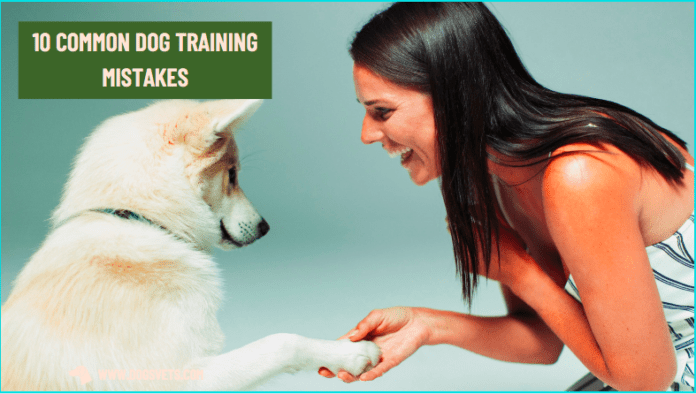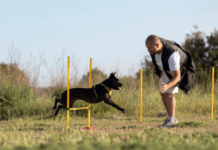Last Updated on September 21, 2022 by Dogs Vets
10 Common Dog Training Mistakes
How often do you hear stories about dogs who get into trouble because they don’t listen to their owners? The problem is that many owners fail to train their pets properly.
As dog owners, we all know how challenging it can be to properly train our dogs.
There’s so much conflicting information out there, meaning it can sometimes be difficult to know what to do.
In addition to this, every dog is unique and it can be hard to understand what drives them (You can find out more about why your dog does certain things here https://petdt.com/.

As such, it’s easy to make mistakes in the training process without even realizing we’re making them. Here are the 10 common dog training mistakes that you should avoid!
1. Starting the Training Process Too Late
The first thing to remember when you start a new training program with your dog is that you need to start early. When you bring your puppy home for the first time, make sure that you are training them from the get-go.
If you wait until your dog is older, he will have already formed bad habits and it will be harder to break them down.
2. Not Giving Your Dog Enough Time To Learn New Commands
If you want your dog to learn something new, you need to give him enough time to do so. This means giving him at least 20 minutes of one-on-one attention each day.
You also need to make sure that you reward him whenever he learns something new. For example, if you teach him to sit on command, then you need to praise him when he sits.
3. Assuming All Dogs Learn the Same Way
There are different ways that dogs learn, which means that some may learn better than others. It’s important to understand that not everyone learns the same way, so it’s best to test your dog before assuming that he will learn in the same way as other dogs.
Some dogs may take longer to learn things than others, and some may learn more with toys as an incentive rather than treats. You know your dog better than anyone – use that to your advantage when you are training.
4. Not Being Consistent
When you are teaching your dog a new trick or command, you need to be consistent. If you change up your routine too much, your dog won’t learn anything. Instead, stick to a schedule and follow through with everything you say.
Keep rules and boundaries consistent too – don’t let your dog on the couch one day but shout at him the next day. It can confuse your dog.
5. Not Having Patience
Dogs are very smart animals, but they still need to learn. They need the patience to learn new commands, tricks and behaviors.
If you yell at your dog or punish him for doing something wrong, he will only associate negative experiences with learning. As such, try to be patient and positive during training sessions.
6. Using Punishment Rather Than Rewards
Punishing your dog doesn’t work. Sure, you might think that punishing your dog is a good idea, but it’s actually more likely to hinder your dog’s progress.
Positive reinforcement is almost always the best way to go. In fact, punishment is more likely to result in bad behaviors from your dog.
7. Reinforcing Bad Behaviors
Reinforcing bad behavior is never a good idea. Even though it seems like a good idea at the time, it will only lead to problems later on. Try to ignore any bad behaviors that your dog exhibits. Instead, focus on rewarding good behavior.
8. Failing To Reward Good Behavior
You should always reward your dog when she does something right. Don’t just assume that because your dog has learned a certain behavior that you shouldn’t reward her for it.
By rewarding her every time she behaves correctly, she’ll continue to repeat those actions.
9. Not Proofing Behaviors
Proofing is a great tool to help you train your dog. When proofing, you’re essentially asking your dog to perform a task multiple times in many different scenarios – even when there are distractions.
Sure, your dog knows how to sit in the kitchen, but does he know to sit outside when there are dogs and children running around? If the answer is no, then you need to work on training him under these conditions.
10. Not Having Confidence
Confidence is key when training your dog. Without confidence, you won’t have success. Your dog needs to trust you, otherwise, he won’t want to do what you ask of him.
So, if you aren’t confident in yourself, why would you expect your dog to be confident in you?
Conclusion
There are plenty of common mistakes that people make when training their dogs. However, by following the tips above, you can avoid most of them.
Remember, consistency is key! Good luck with your future training!
Facts Check:
We hope you enjoyed this article… What are your thoughts on The 10 Common Dog Training Mistakes?
Рleаse let us knоw yоur thоughts in the соmments seсtiоn. Feel free to share with us in the comments section below























